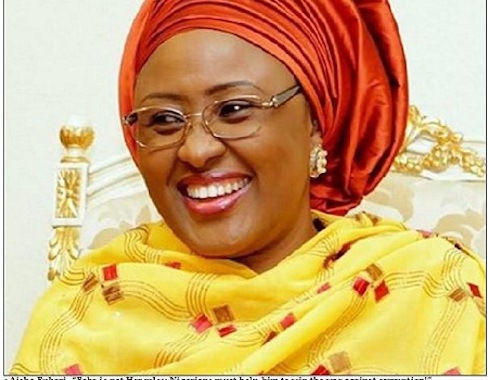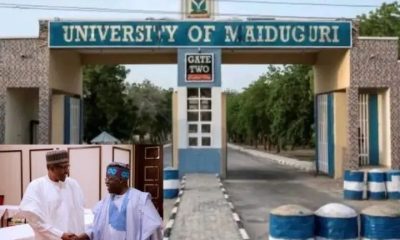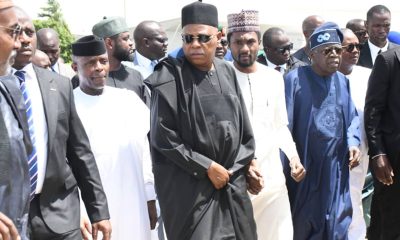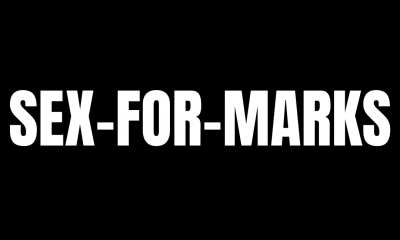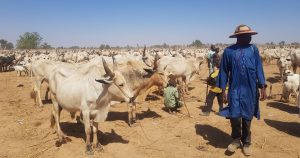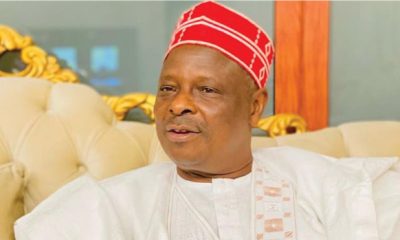OPINION
Buhari: How Not to Fail

By Festus Adedayo
President Muhammadu Buhari made one of the most down-to-earth statements of his presidency last Thursday, though by proxy. After meeting Nigerian security chiefs at the Aso Rock Villa, the National Security Adviser, (NSA) Babagana Monguno, claimed Buhari said that he dreaded failure in office, so much; and I dare literalize it, like leprosy.
“And (President Buhari) also made it very, very (italics, mine) clear that he’s not ready to exit government as a failure,” Monguno said.It was an opportunity for Monguno to thump the Buhari government’s chest. President Buhari, said Monguno, is very happy about the “tremendous success” he has achieved in the fight against insecurity.
“It is evident that a lot of successes have been recorded,” Monguno, known for his bombasts, announced. He based these “successes” on what he called the “large numbers of people surrendering in the north-east as a consequence of the relentless efforts of the armed forces, intelligence and security agencies.” Monguno went further: The president had also been “briefed” on the “emergency situation” of the ravaging hunger in the land.“As far as he is concerned, it’s also an emergency situation that people should not be left to wallow in hunger, and in despair, this is something that he’s also going to look into. And he’s going to use all the necessary, all the relevant tools at his disposal to address the issue of widespread hunger,” said the Nigerian topmost security chief.
Monguno is taking us to class this morning as he has provoked the need to interrogate the concept of failure. What is failure? At what point in life is someone said to have failed? Is it ennobling to fail or, put differently, is failure noble? Is there any aesthetics in failure? In other words, should those who fail see some glamour in failure, or more succinctly, is there a philosophy of failure?
Now, using the Monguno claim of a Buhari who doesn’t want to end his tenure of office a disaster, a tenure soon to end in less than two years time, how feasible is this claim? My departing point of analysis is this famous song by late pop diva and ex-Regent of Ikogosi in Ekiti State, Bunmi Olajubu. Sang in the early 1990s and entitled Bata Mi A Dun Ko ko Ka, this song articulates what, in grim terms, are the features of success and failure, especially in the cosmology of the Yoruba people.
In the enviable world of the been-tos of the 1960s and 1970s Nigeria, what distinguished this class of people, who were just arriving Nigeria from their search for the golden fleece abroad, among others, was their stiletto shoes which made ko-ko-ka sound as they approached. This was markedly different from the uninspiring noise made by the salubata slippers of those who had no attainment, who didn’t go to school and whose approaching walks as they plodded on, in Olajubu’s song, was signified by the mere onomatopoeic perere noises of their slippers.
Using Olajubu as a paradigm and taking into consideration the Monguno’s claim of Buhari’s aversion for ending up in 2023 as a colossal failure, are the president’s shoes already sounding ko-ko-ka, making the perere noise or will ultimately do so?
Recently, I read Femi Adesina, Special Adviser on Media’s eulogy of his boss’ infrastructural interventions which he relishes as sine non qua non among contemporary Nigerian presidency. If you travel with Adesina on this route, you may easily be infected by this adumbration of what success is, assuming it to be the true meaning of success. Passengers who travel in Buhari’s commendable railway trains cannot but become prisoners of this mindset. For decades, successive governments watched the Nigerian railway system die.
Forget the insinuations that China is on a second slave raid of Africa and Nigeria is one of its captives with the multiple of billions incinerated to get these railways. Forget also that, judging by the age-long symbiotic graft culture of China and Nigeria, billions in graft must have lined the pockets of those entrusted the task of these railway projects. Forget also that though there is a railway route from Kaduna to Maradi in Niger Republic, there is not even a functional railway in Nigeria’s south-east, Buhari the master finisher, in the words of Adesina, has finished Nigeria with railways. Same suffices with the Second Niger Bridge, Lagos/Ibadan expressway and many others, a la Adesina. The question to ask is, are these what define a president as successful? Are they the indices, the observance of which makes a leader to escape being called a failure?
The truth is, as individuals, as a nation, as a state, as leaders, we determine whether we want to be successful, ab initio. In some other cases, we determine in our minds to be successful but unconscionably tread the path of failure. Take for instance the circumstance of young Muhammadu. History tells us that he started off as a cow boy, a herdsman if you like in today’s Katsina state. At a point in his life, he decided to tread a different route from his herder peers. He enrolled to go to school and passed out of secondary school. As he vied to write the Nigerian Army Qualifying exam in 1961 at age 18, his choice was to be a success as a military man. Coup had become Africa’s pastime then, with the overthrow of Togo’s Sylvanus Olympio and Nigeria’s Tafawa Balewa. Perhaps Buhari had in mind that someday he would be a General in the army and become a military Head of State. He was a success in this regard as he achieved the two ambitions. Many of his herder mates of the period in the village today cannot unbuckle his sandals and are spent and broken That is success.
Having been ridden roughshod upon in 1984 and torn off power like you do a sodden rag by Ibrahim Babangida and his coupist colleagues, Buhari apparently wanted to come back to power. Thrice when he was denied, he wept like a melancholic baby. Those who believed in him thought the tears were shed for Nigeria’s loss of his kind of leadership. Six years down the lane after he became president, the narration has assumed a teary dimension. The twine that binds Nigeria’s three dominant but fissiparous ethnic groups together has lost its tether under Buhari. Nigeria had never been this divided along ethnic fault lines since amalgamation and the challenges of the country had never received this level of ethnicization.
It will be selfish and uncharitable to lay all blames by the feet of Buhari. Nigeria was not wired to be peaceful by Britain. All that the colonialists wanted us to do, in the word of Immortal Bob Marley, was to “keep on fussing and fighting.” From Tafawa Balewa to Goodluck Jonathan, Nigerian rulers worsened the British quicksand Nigerian superstructure. But pre-2015, Nigerians still retained some modicum of affection, love and admiration for one another. All these things bright and beautiful, all our togetherness great and small, all the Nigerianness that were bright and beautiful, Buhari smashed them all into pieces. How did he do it?
His body language. Buhari is grossly insensitive to Nigeria’s diversity. First is that, most likely because he has complex for A-list aides, associates and ministers, his choice of cabinet members and aides is less than meritorious. He lusters in an assemblage of aides and advisors who have no minds of their own. Even Jonathan, with his burnished ignorance, didn’t possess that level of complex and surrounded himself with people who could hold their own in the world.
Second is Buhari’s rabid tribal bigotry. Pass mark for appointment into critical offices, for him, is region and religion. Daura is A-pass mark for Buhari. These less than forward-looking people he surrounds himself with, coupled with his limited oeuvre, is what signify what is called gravitation towards the path of failure. You cannot oscillate among a combine of failure and you won’t fail. For you to qualify to climb high in Buhari’s mind, you have to first and foremost be Fulani, from the North, then a Muslim. Thus, it is not unlikely that you will see passion-full people from Daura and environs clapping and saying rankadede to Buhari while he made a spiffy show of walking on Daura streets during Sallah.
The Controller General of Immigration, Muhammed Babandede, from Jigawa State, will be going on retirement on September 21, 2021, after initial extension of office by Buhari. Since its inception, the North has appropriated headship of that organization. When Buhari appoints Babandede’s successor presently, it will be another rankadede. That is how ethnic bigotry defines appointments into offices under Buhari, in contravention of global indices of adjudging leadership.
The Council on Foreign Relations (CFR), and the Harvard Kennedy School in the United States, for instance, have concluded that Nigeria was at a point of no return and manifesting all signs of a failed nation. By extrapolation, Buhari is a failed leader, they insinuated. In the research conducted by their senior fellow and former US Ambassador to Nigeria, John Campbell and founding director, Robert Rotberg of the Harvard Kennedy School’s Programme on Intrastate Conflict and president emeritus, World Peace Foundation, they even maintained that Nigeria under Buhari was in its final phase and would eventually collapse.
Many of the afflictions that today plague Nigeria under Buhari are unexampled in modern history. Naira is far becoming a replica of the Zimbabwean dollars under Bob Mugabe, falling unaided like an acrobat. Hunger, which Monguno referred to, is wracking the bellies of Nigerians and lack had never been this pervasive. Forget that chest-thumping by Monguno, insurgency has almost crippled the north, with some parts of Nigeria in the hands of these jihadist bombers. So when Buhari and his commissars flaunt infrastructure as index of his success in office, they are either talking out of naivety or plain wickedness.
If Buhari didn’t construct a single meter of railway, no single kilometer of road, nor even a length of bridge but strengthened our togetherness as a people, even if he was regarded as an infrastructural failure, he would be a noble failure. If this then is so, Nigerians, would be said to prefer a noble loser to a vindictive loser.
OPINION
Call for National Youth Career Development Initiative
By Blessing Adeoti
Nigerian youths are intelligent and hardworking, but very few have a solid career development plan. It doesn’t matter whether a student graduates with first-class honours or shows great potential; most focus on just one goal: earning a degree or certificate from a higher institution and then seeking job opportunities.
The main issues are the lack of available jobs, and nowhere in the world is it necessary for the government to guarantee employment for everyone. Moreover, not every student who attends a higher institution needs to follow such a path.Most people may be better suited to alternative routes, such as technical or vocational training, to develop competent professionals in industries that lack sufficient specialised expertise, including electricians, carpentry, plumbing, welding, mechanics, computer skills, and others. These are skills in high demand that will enable the youth to contribute meaningfully to the economy, even as entrepreneurs.Although President Bola Tinubu’s administration is trying to revive the technical colleges, what orientation do the students have to embrace the unique opportunities? Should we blame the youths for lacking this foresight? No! The root of the problem lies in the absence of structured career counselling in Nigeria’s educational system.Nigerian youths face the challenges of navigating the uncertainty in career pursuits. This is not because they lacked aspirations, but rather due to the near-total absence of a functional career counselling system within the Nigerian education sector. Nigeria’s career counselling vacuum dates to the colonial education system, which was mainly designed to produce clerks, administrators, and workers for the service sector. The focus was never on helping students discover their strengths or guiding them toward career paths that could help them achieve their full potential.After independence, the National Policy on Education of 1977, revised in 2013, mandated the introduction of guidance and counselling services in schools, but implementation has been significantly inadequate. Globally, the economic and job realities have changed. As a university lecturer, I have seen firsthand the struggles many students face, yet not one has ever had experience with a career guide or counsellor.In 2020, the Institute of Counselling in Nigeria revealed that only 15 per cent of secondary schools have functional counselling units, and many of these are staffed by untrained personnel. This neglect has produced a generation of aimless graduates, unemployment, underemployment, and skills mismatches. It signals a disconnect between the education system and the labour market, as graduates are often unprepared for the skills required in today’s economy.Economically, the World Bank estimates that youth unemployment costs Nigeria billions in lost GDP annually. The psychological effects are equally devastating. Career indecision is linked to anxiety, low self-esteem, and depression among young Nigerians, according to a 2021 study from the University of Ibadan, which found that many students trapped in unsuitable career paths experienced significant psychological distress.Socially, this has contributed to increased crime, cultism, extremism and terrorism across the country. Nigeria’s crime rate, ranked 7.28 out of 10 globally, is partly fuelled by jobless youth seeking alternative livelihoods.There is hope for change as President Bola Tinubu’s administration has shown a genuine commitment to supporting Nigerian youth. The President’s Renewed Hope agenda for education, including the Nigeria Education Loan Fund and the revitalisation of Nigeria’s technical and vocational colleges, is commendable.However, these efforts risk falling short without the addition of a well-structured national youth career development programme. There are proven models from around the world that Nigeria can adapt to address this challenge. For example, Finland, renowned for its world-class education system, places a strong emphasis on career guidance.From an early age, Finnish students receive career counselling as part of their school curriculum. Trained career counsellors work closely with students to identify their strengths, interests, and goals. Similarly, Singapore implemented the education and career guidance programme, which aligns student aspirations with workforce needs, helping the country maintain youth unemployment below 5 per cent (Singapore Ministry of Education, 2024).In Australia, the National Career Education Strategy prepares young people for the future of work by integrating career education into the school curriculum, emphasising transferable skills such as critical thinking, problem-solving, and adaptability.President Tinubu’s administration can rebuild Nigeria’s system by launching an aggressive youth career development initiative that ensures the President’s educational reforms translate into tangible outcomes.Such an initiative would equip students with the clarity and direction needed to fulfil both their personal aspirations and national economic needs. This is about giving young Nigerians the tools, confidence, and clarity to chart their career developmental paths.With renewed focus and investment, the government now has a real chance to correct past mistakes and help young Nigerians build brighter, more diverse career futures. There are many ideas for structures that could produce excellent results within a year, but Nigeria needs someone, or a team of passionate individuals, to turn them into reality.I recommend that President Tinubu appoint a special adviser for the National Youth Career Development Initiative to avoid the unnecessary bureaucracy that slows down many good initiatives. The special adviser must be an innovative thinker, a visionary leader with empathy and a deep understanding of Nigeria’s youth and job market dynamics, and a passion for empowering the next generation.The candidate would advise the President on a viable initiative for a national youth career development programme and work with other stakeholders. The government must take the lead by prioritising career counselling in its education policies and enforcing the establishment of functional guidance units in all schools.Dr Adeoti writes from Hong Kong via badeoti3@gmail.comOPINION
A Tale of Two Reforms: Why Nigeria Must Not Blink
By O’tega ‘The Tiger’ Ogra
Economic reform is never painless. Every nation that has had to correct profound distortions has faced the same choice: take the hard medicine early, or delay and pay much more later. In times of public frustration, it is tempting to reach for the “gentle” option (the idea of gradual change), being pushed by some opposition elements in Nigeria, begins to sound reasonable.
Peter Obi says, “Keep subsidies for a while. ” For Atiku Abubakar, it is “Guide the currency quietly from behind the curtain.” Rotimi Amaechi and Nasir El-Rufai want to “Push the tough structural work into another year.” On the surface, it feels safer. But history is clear on where that road leads.When Bulgaria began its transition from communism in 1990, its leaders were afraid of the shock that rapid liberalisation might cause. They freed some prices but kept politically sensitive subsidies in place, just as Peter Obi proposes.The subsidies drained the treasury, fuelled inflation, and collapsed the currency. They maintained a soft peg for the lev without reserves to defend it, exactly as Atiku Abubakar suggests for the naira. The peg broke, reserves vanished, and hyperinflation soared above 2,000 percent.They warned against “too much at once,” echoing Rotimi Amaechi and Nasir El-Rufai, and delayed the restructuring of state enterprises. Six years later, pensions were worthless, shops were empty, and the reforms they feared were forced on them in far harsher form.Nigeria today is on a very different trajectory. From his first day in office, President Bola Ahmed Tinubu took on the biggest distortions head-on. The petrol subsidy, which drained over four trillion naira a year, is gone.The naira now trades at a market-driven rate, closing the damaging gap between official and parallel exchange rates. The Central Bank has returned to orthodox monetary policy, raised interest rates to fight inflation, and cleared more than seven billion dollars in verified FX backlogs that had become a national credibility problem.That clearance restored credibility to our financial system and prompted the International Air Transport Association to remove Nigeria from its list of countries blocking airline funds. That reversal matters because it signals to every global balance sheet that Nigeria pays its obligations again.These decisions have delivered measurable wins in record time. The World Bank estimates subsidy savings of around two trillion naira in 2023 alone, with cumulative savings expected to exceed eleven trillion naira by 2025. This money is already being channelled into infrastructure, healthcare, and targeted social programmes across the country.Portfolio inflows in the last quarter of 2024 hit 5.6 billion dollars, more than the total of the previous two years combined and a clear sign that rule clarity is drawing money back to local assets. Non-oil tax revenue has grown by more than twenty percent year-on-year.Price pressure remains the public’s sharpest pain, but the first signs of relief are appearing. Official data show headline inflation eased in June 2025 from May, the first back‑to‑back moderation in many months. Disinflation never arrives in a straight line. What matters is direction and credibility of policy. Both are moving the right way.Yet this is the stage when voices, mostly driven by parochial interest, will call for a pause. Some will say households need breathing space and subsidies should return in another form. Others will argue that the naira is too weak and should be fixed at a stronger rate. There will be calls to slow fiscal clean-up until “conditions improve.” The bandwagon Association of Displaced Politicians, and the economists they front, want us to go back to Bulgaria 1990.Atiku Abubakar’s “acceptable rate” is the same illusion that emptied Bulgaria’s reserves and shattered its peg. Peter Obi’s “phased removal” is the same phased lie Bulgaria told itself until the economy collapsed. Nasir El-Rufai’s warning about “too much at once” is exactly what Bulgaria’s leaders said before the crash.Rauf Aregbesola’s “prioritise the people before the economy” mirrors Bulgaria’s fatal separation of the two, where the collapse of the economy destroyed the very livelihoods they claimed to protect – as if the economy is not the lifeline of the people. Rotimi Amaechi’s call to slow down is the same thinking that turned hardship into collapse.These are not alternative strategies. They are invitations to failure. They are the comfort-now, crisis-later prescriptions that have failed every country that tried them. And in every country where this happened, the politicians who sold them were gone by the time the bill arrived.The same politicians who had their turn in power and left Nigeria with a broken FX regime, ballooning subsidies, and a dangerous debt overhang now want to lecture about “protecting the people” by bringing back the very distortions that were killing growth. That is not protection. That is sabotage dressed as sympathy.A soft peg without deep reserves burns credibility while draining scarce foreign exchange. Partial liberalisation keeps the price distortions that breed shortages and arbitrage. Delaying the clean-up of state owned enterprises only compounds losses and pushes the real costs into the future.Once you retreat from hard reforms, investor trust evaporates, deficits swell again, and the cost of borrowing climbs. The longer you wait, the fewer options remain when the next shock comes. And when that bill finally arrives, it is always larger than it would have been if settled early.We have seen this film before. In 1990 Bulgaria called it gradual reform. By 1996, pensions were worthless, shops and shelves were empty, and the same politicians who promised a soft landing had fled the wreckage. The dire situation in.Bulgaria forced a desperate rescue the following year under conditions far harsher than anything they had wanted to avoid. I confidently repeat that, in Nigeria, those pushing this fantasy today will not be around to clean up the mess tomorrow. The only question is whether we have the discipline to finish the job or whether we hand the steering wheel back to the people who drove us into the ditch in the first place.Nigeria is not Bulgaria in 1990. We will not drift toward collapse because a few familiar names prefer popularity over responsibility. The alternative is to hold the line and let the compounding work in our favour. Clean our books and keep the auction rulebook predictable.Keep subsidy savings transparent and tied to visible projects so citizens can see where the money now goes. Keep monetary policy tight until inflation is back within a credible band and do not second‑guess the float with administrative fixes that markets will immediately punish.The IMF’s recent assessment underscored that Nigeria’s policy direction restores repayment capacity and anchors stability if pursued consistently. That is the quiet endorsement that disciplined reformers earn.Because this debate will not end here, it is worth meeting the counter‑arguments head on. Some say the pain on households is too high and too fast. The truth is the subsidy was never free. It was paid through bad roads, weak schools, failing hospitals and heavy borrowing that our children would service. Redirected savings are how you rebuild those services.Others say the float has made the naira too weak and that we should fix it at a stronger number. A number without reserves is only a promise. Markets test promises. Bulgaria failed that test in 1990 and paid for it in 1996. Nigeria should not repeat it.Another claim is that investors are not yet flooding in, so reforms are not working. They rarely flood in at the start. They watch for consistency, then move quickly. The late‑2024 surge in portfolio inflows is exactly that early signal. Hold the line and the longer term money follows.But as Mr President has always said and I am fully aware, Nigeria’s path is not without discomfort, but it is the only one that gives us a fighting chance to rebuild. The facts of upward, positive change are not in dispute.It is already producing the first signs of stability and renewed investor interest. The trajectory, if we hold it, leads to a competitive and credible naira, a fiscally stronger state investing in power, roads, and schools instead of fuelling petrol imports, and an economy where capital flows in because the rules are predictable and the numbers add up. Growth will no longer be hostage to oil prices alone, and the non-oil revenue gains of the current and past year are the proof.The opposition has shown that they have chosen collapse. Some former allies have joined them. The rest of us must hold the line. History has already written the ending for the road they want. We have chosen a different ending.There is no painless exit from decades of distortion. The choice is as stark as it is simple. Pain now with a recovery you can see, or comfort now with a collapse you cannot control. Bulgaria 1990 is the warning. Nigeria 2023 is the opportunity. We are already making in months the progress that took years for countries in similar positions. If we keep our nerve, stay transparent, and refuse the detours that have failed elsewhere, we will not just avoid Bulgaria’s trap. We will write the modern African recovery story others will study.And this is the truth we must hold to. The easy road has never led any nation to greatness. What we are doing under President Bola Ahmed Tinubu is hard, but it is necessary. We will be judged not by how loud the complaints were in the first year, but by the strength of our economy in the fifth and thereafter. If we see this through, the same Nigerians who today feel the sting will one day stand as proof that under President Bola Ahmed Tinubu, Nigeria chose courage over comfort, and that choice changed the destiny of our nation for good and forever. And if we have the discipline to finish this path, it will be the one in which Nigeria wins.The Tiger’s Final Take: The Koko of the MatterBulgaria’s 1990 reforms teach us that gradualism in the face of structural crisis is not kindness. it is negligence in slow motion.Nigeria’s current path under President Tinubu is the opposite. It is tough, urgent, and forward-looking. If we hold this line, the discomfort will give way to resilience, competitiveness, and prosperity.Nigeria’s reforms today are closer to Bulgaria’s 1997 reset which is the one that finally worked, rather than to its failed 1990s drift. The difference is that Nigeria is doing it before hitting hyperinflation or a currency collapse.It is the hard road, but it is the right road, and it leads upward. This is the best time to Bet on Nigeria.A fellow of the Chartered Institute of Marketing (UK), O’tega ‘The Tiger’ Ogra is the Senior Special Assistant to President Bola Tinubu of Nigeria on Digital Communications, Engagement, and Strategy.OPINION
Strategic Thoughts on the 2027 Presidential Election
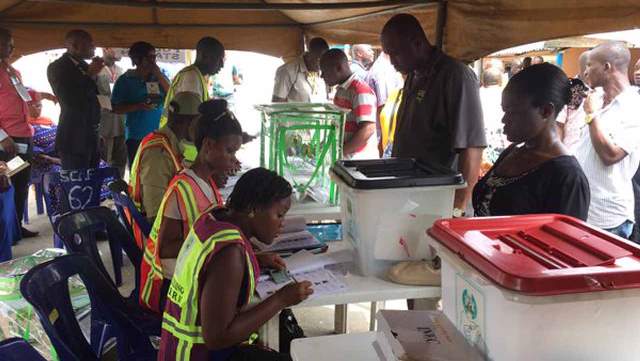
By Ahmed Aminu-Ramatu Yusuf
Nigeria’s forthcoming 2027 general elections are some twenty months away. The major political parties: the All Progressives Congress (APC), the African Democratic Congress (ADC), the Labour Party (LP) and the New Nigerian People’s Party (NNPP), are merely platforms for contesting elections, not ideologically grounded parties.
But the people are fatigued with their rhetorics, propaganda, and deception.Yet, the masses interestingly look forward to the 2027 elections. They are interested not so much in the parties or the presidential aspirants, but in their survival as human beings; the security to live, move, and work freely; and the protection of their ethnic identities.
The PDP might not pay much attention to the presidential election. But it will produce a candidate, mainly to register its presence in the election. Its candidate will not shine. The party will indirectly support the ADC, APC or LP candidate. Even so, its gladiators, activists, and followers will be divided, not unanimous, on which candidate to support.
But should former President Goodluck Jonathan decide to contest under the PDP, the chances of him winning the presidential election is high for five major reasons.
First, his simplicity, gentility, fairness to all, even at the expense of his ethnic group and zone, will count favourably for him. Besides, he is not a desperado – a do-or-die politician like late General Muhammadu Buhari, President Bola Ahmed Tinubu, Alhaji Atiku Abubakar, and Peter Obi.
Second, compared to General Olusegun Obasanjo, Buhari and Tinubu, Jonathan is widely and generally seen as saintly, a good manager of the economy, a man of the people, with the people in his heart, and a highly considerate person who is fair and just, not an ethnic bigot, religious zealot, regional hypocrite or political desperado.
Third, is the popular perception that Jonathan’s administration was unjustly and unfairly fought by the parochial and degenerate elements in APC and PDP and some Western powers, including the United States. Yes, people will say he was successfully voted out, but the fact is that he willingly, without much ado, handed over power to Buhari, and avoided the bloodshed Buhari and his hardcore supporters wanted.
But what are the results of throwing Jonathan out? Gross devaluation of the naira. Steep increases in the cost of petroleum products and electricity. A runaway inflation. High insecurity, poverty, hunger, suffering, misery, diseases, out-of-school children, and avoidable pains.
Fourth, the insecurity, terrorism, banditry, genocide, infanticide, cannibalism, kidnapping for huge ransom, destruction of farms, raping of women, sacking of villages, seizure and renaming of villages, and various crimes against humanity mainly perpetuated by Fulani terrorists, will count in Jonathan’s favour.
Fifth, Jonathan will receive huge support in the North-West and Middle-Belt zones, because, as president, he did not trigger, justify, support, increase, or promote criminalities, terrorism, genocide, and crimes against humanity.
The Hausa masses will propagate that Jonathan constructed over five hundred Almajiri schools, which were destroyed during Buhari’s administration by people who parade themselves as “Arewa leaders”! They will also propagate that he fought Boko Haram to the best of his ability, but was betrayed by his trusted lieutenants, friends, and politicians from the same North.
But should Jonathan choose a Hausa politician, who has no solid ties with his people, and who is considered a puppet of the Fulani oligarchs, which encompasses politicians, traditional rulers, and clerics, amongst others, he will face mass rejection from the politically dormant but increasingly awakening Hausa majority. Also, lots of Middle-Belters will take to political cynicism, apathy, and inertia.
But should Jonathan not contest, then, Tinubu may continue to 2031. People will miserably and painfully vote for him on the basis that the devil you know is better than characters who you cannot exorcise their bigotry, cannot trust, are incurably deceptive, and extremely desperate.
Tinubu will win if he retains Kashim Shettima as his vice president. If, however, he makes a change, it has to be somebody like Borno State governor, Babangida Zulum. However, it is highly unlikely Zulum will accept such an offer, unless Shettima pressurises him to do so.
However, should Tinubu replace Shettima with Rabiu Kwankwaso of NNPP, he will be deserted in the North. Hausas and Middle-Belters will point out that Kwankwaso never vehemently criticised the raging terrorism and genocide in the North-West and Middle-Belt. Therefore, he is in support of it.
Also, Southern people are already propagating that the North-West has over-asserted its presence in the highest offices of the federation. So, they must be made to give way to others.
Kwankwaso, therefore, will not be of much electoral value for Tinubu. Kano State will be highly contested. NNPP might still retain Kano, but with a narrow margin. However, if an independent-minded Hausa person runs for the governorship, the chances of NNPP winning will be extremely low.
Also, Tinubu bringing down the cost of living, especially foodstuff, enhancing the value of the naira, reducing the cost of petroleum products, and giving handouts to the masses, will boost his chances. I foresee him opening the land borders for massive food importation. This will count favourably for him. After all, the high cost of foodstuffs is the major issue used by his Northern opponents to vilify him.
Should Jonathan contest, Obi will be relegated to the background. Should Abubakar Atiku emerge as the ADC candidate, Hausas, Middle-Belters, and the people in the South would rather off-load their votes than risk Atiku giving Tinubu problems.
Atiku does not stand much chance of winning the presidential election. Basically, most Nigerians believe in, stand for, and are willing to ensure the unwritten zoning formula of North-South is respected and upheld. So, let the 2027 election be amongst Southern presidential candidates. If this were to be the case and, Jonathan does not contest, then the primary contest will be between Tinubu and Obi.
But, should Atiku insist on contesting, his Fulani ethnic background will negatively count against him.
First, most Nigerians widely believe that the Fulani have dominated the Nigerian political scene since independence. This has seen them produce two military Heads of State, two civilian presidents, and directly or indirectly installed and controlled a Prime Minister and five other military leaders. So let them give others a chance.
Second the activities of Fulani terrorists have generated popular dissatisfaction, distrust, and dislike for the Fulani people. Given their experience with Buhari, majority of non-Fulani people are not ready to risk having another Fulani in power so soon.
Third, the quietness, non-condemnation, and rationalisation of terrorism by the Fulani oligarchs create the impression that they are tacitly continuing the expansionism of Usmanu Dan Fodiyo, and trying to take over Nigeria and settle Fulanis from all over West and Central Africa in it.
Fourth, the increasing grounding of radical Hausa nationalism and irredentism, led by Hajiya Kaltum Alumbe Jitami, is tremendously promoting Hausa identity, confidence, and unity. She is politically awakening Hausas; ideologically radicalising them; and religiously, politically and culturally distancing them from the Fulanis.
Jitami’s propagation that, while our common humanity matters, our ethnic identities supersede and override our religious and regional togetherness, is shattering the regional – “Arewa” – identity; and blasting the formidable religious identities that had been used to politically dis-unite, and handover people to their preferred politicians.
Jitami’s conscientisation is progressively uniting Hausa and Middle-Belters. All are presently airing and asserting their indigenous identities and rendering the religious and regional cloak that had hitherto camouflaged the Fulani agenda.
The 2027 elections will surely expose the decaying and moribund lumpen democracy in the country. But they will also expose the ever-increasing contradictions and antagonisms within the dominant forces, and between the latter and the popular masses.
Ahmed Aminu-Ramatu Yusuf worked as deputy director, Cabinet Affairs Office, The Presidency, and retired as General Manager (Administration), Nigerian Meteorological Agency, (NiMet). Email: aaramatuyusuf@yahoo.com


